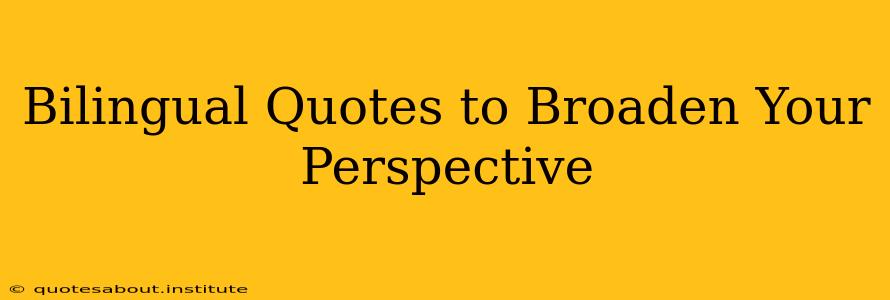Learning a new language opens doors to new cultures, perspectives, and ways of thinking. Bilingualism itself offers a unique advantage, allowing you to appreciate the nuances of different languages and how they shape our understanding of the world. Bilingual quotes, in particular, offer a fascinating lens through which to explore these diverse viewpoints. They encapsulate wisdom, wit, and emotion in a way that transcends linguistic boundaries, enriching our understanding of the human experience. This article explores the power of bilingual quotes, offering examples and insights into why they resonate so deeply.
Why are Bilingual Quotes so Powerful?
Bilingual quotes are powerful because they highlight the inherent beauty and complexity of language itself. They demonstrate how different words can capture the same sentiment, yet with subtle variations in meaning and tone. This exposure to multiple linguistic perspectives fosters critical thinking and a deeper appreciation for the subtleties of expression. Seeing the same idea expressed in two languages often reveals new layers of meaning, challenging our preconceived notions and broadening our perspectives.
Examples of Bilingual Quotes that Broaden Perspectives
Here are some examples of bilingual quotes showcasing the richness of expression in different languages, categorized for easier navigation:
Love and Relationships
- English: "The best and most beautiful things in the world cannot be seen or even touched - they must be felt with the heart." - Helen Keller
- Spanish: "Las cosas mejores y más bellas del mundo no se pueden ver ni tocar; deben sentirse con el corazón." - Helen Keller This quote, in both English and Spanish, emphasizes the intangible nature of love and beauty, a sentiment universally understood regardless of language.
Life and Wisdom
-
English: "The journey of a thousand miles begins with a single step." - Lao Tzu
- Mandarin Chinese: 千里之行,始于足下 (Qiānlǐ zhī xíng, shǐ yú zú xià) This proverb, deeply rooted in Chinese philosophy, highlights the importance of taking that initial step towards achieving long-term goals. The simplicity of the English translation belies the cultural richness embedded within the original Chinese.
-
English: "The only way to do great work is to love what you do." - Steve Jobs
- French: "La seule façon de faire un grand travail est d'aimer ce que vous faites." - Steve Jobs This quote highlights the interconnectedness between passion and success, a universal truth regardless of language or cultural background.
Motivation and Perseverance
- English: "The future belongs to those who believe in the beauty of their dreams." - Eleanor Roosevelt
- German: "Die Zukunft gehört denen, die an die Schönheit ihrer Träume glauben." - Eleanor Roosevelt This quote inspires hope and emphasizes the importance of vision and perseverance in achieving goals, a message translatable across languages.
What are some other benefits of learning a second language?
Learning a second language offers a multitude of cognitive, social, and professional advantages. Studies have consistently shown that bilingual individuals often exhibit improved cognitive flexibility, problem-solving skills, and enhanced memory. Furthermore, bilingualism opens up opportunities for greater cultural understanding, broader social networks, and enhanced career prospects in a globalized world.
How can I learn a new language effectively?
There are many effective ways to learn a new language. Immersion, through travel or living in a country where the language is spoken, is often cited as one of the most effective methods. However, language learning apps, online courses, and traditional classroom settings can also be highly effective, depending on individual learning styles and preferences. Consistency and active engagement with the language are key factors in achieving fluency.
What are some resources for learning a new language?
Numerous resources are available for language learners, catering to all levels and learning styles. Popular language learning apps include Duolingo, Babbel, and Rosetta Stone. Online platforms like Coursera and edX offer structured language courses taught by university professors. Local community colleges and universities often provide language classes as well. Finding a language exchange partner or tutor can also be incredibly helpful.
Are there any bilingual dictionaries or phrasebooks I can use?
Yes, many bilingual dictionaries and phrasebooks are readily available, both in print and digital formats. These resources provide translations and often include helpful pronunciation guides and cultural notes. Choosing a dictionary or phrasebook that aligns with your specific language pair and learning needs is essential.
By exploring these bilingual quotes and considering the questions above, we gain a deeper understanding of the multifaceted nature of language and its impact on shaping our perceptions and expanding our worldviews. The journey of learning another language is a rewarding one, enriching not only our communication skills but also our minds and hearts.

